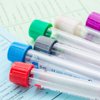Fritextsökning
Artiklar per år
Innehållstyper
-

Fyra nya ansikten i Lif:s styrelse
Fyra nya ledamöter – från Haleon, Takeda, BMS Norden samt Merck Sverige – har valts in i styrelsen för branschorganisationen Lif - de forskande läkemedelsbolagen.
-

Samuel Lagercrantz: The government’s performance in healthcare and life sciences so far
Since the change of government in Sweden, developments in the healthcare sector have shown promising signs, but the outlook in life sciences is less promising, writes Samuel Lagercrantz in an editorial.
-

Alligators huvudkandidat får särläkemedelsstatus – ”En milstolpe”
Alligator Bioscience har beviljats särläkemedelsstatus i USA för sin huvudkandidat mitazalimab.
-

Samuel Lagercrantz: Så levererar regeringen hittills inom sjukvård och life science
Det finns goda tecken inom sjukvårdsområdet sedan regeringsskiftet, men inom life science ser det däremot mindre lovande ut, skriver Samuel Lagercrantz i en ledare.
-

Confidence in childhood vaccines is in decline worldwide
Since the pandemic, confidence in vaccinating children has plummeted. In a new report, UNICEF urges world leaders to act before the situation worsens. In 52 out of 55 countries surveyed, public perception of the importance of vaccinating children has declined.
-

Förtroende för barnvaccin sjunker i världen
Sedan pandemin har tilliten till vaccinering av barn sjunkit. Det uppger Unicef i en ny rapport och manar världens ledare att agera – innan läget förvärras.
-

Pfizer’s record year – topped the $100 billion mark
In 2022 Pfizer, as the first pharmaceutical company in history, reached an annual revenue of more than 100 billion dollars, thereby surpassing Johnson & Johnson as the industry’s top selling business.
-

Pfizers rekordår – sprängde 100 miljardersvallen
Pfizer lyckades i fjol, som första läkemedelsbolag i historien, sälja för över 100 miljarder dollar under ett år. Det visar en sammanställning över företagen med de största intäkterna inom läkemedelsindustrin.
-

New diagnostic rules raise concerns
In a panel discussion, several voices from academia and the industry expressed concerns about the transition to the new regulatory framework for in-vitro diagnostics (IVDR). They argue that it may create significant differences between regions
-

New drug alert in the US: Rise in overdoses linked to the use of drugs for animals
A combination of the synthetic drugs fentanyl and xylazine, an animal tranquilizer, has been labelled a “growing threat” by the White House due to its role in the ongoing opioid crisis in the US.
-

Alligator tar in nästan 200 miljoner för utveckling av cancerkandidat
Styrelsen för Lundbaserade Alligator Bioscience har beslutat om en nyemission på upp till 199 miljoner kronor. Fokus ligger nu framförallt på den fortsatta utvecklingen av mitazalimab, bolagets läkemedelskandidat mot bukspottkörtelcancer.
-

Förlängd tidsfrist för medtechregler – ”Löser inte alla problem”
Nu står det klart att förslaget om en förlängd övergångsperiod för krav på certifiering enligt EU-regelverket MDR blir verklighet, efter ett beslut i EU:s ministerråd. ”Det är ett steg i rätt riktning, men man ska ändå säga att förlängningen av övergångsperioden inte löser alla problem”, säger Anna Lefevre Skjöldebrand, vd för Swedish Medtech.
-

Nytt namn till Hansa Biopharma
Lundaföretaget Hansa Biopharma har utsett Matthew Shaulis till Chief Commercial Officer och President för dotterföretaget i USA.
-

Stor kartläggning av svensk läkemedelsutveckling - "Väldigt imponerande bidrag"
Trots tuffa tider planerar två av tre life science-bolag att nyrekrytera – och antalet läkemedelsprojekt fortsätter att öka. Det visar branschorganisationen Sweden Bios stora kartläggning av svensk läkemedelsutveckling.
-

The Swedish National Board of Health and Welfare rejects prioritising andrology as a speciality
Male infertility can be linked to a shorter lifespan and several severe diseases, but when couples who want children are examined, the focus is on the woman. Experts in the field claim that andrology needs to become a speciality in Sweden to increase awareness and knowledge. But the Swedish National Board of Health and Welfare says that it is not a priority.
-

“An entire industry is about to be wiped out”
According to Jennie Ekbeck, CEO of Umeå Biotech Incubators, Sweden risks not having any small diagnostic companies left in five years.
-

How critical are the “Spermageddon” reports? – Researchers call for action
A much talked about meta-study indicates that sperm concentration in men’s seminal fluid has halved in 40 years. Experts in andrology that Life Science Sweden speaks to believe that the results must be taken seriously, and call for action from the Swedish authorities.
-

Column: ”Life as a F1 race”
"The F1 car makes several pit stops during a race and during a lifetime the human being may also have to come in several times for maintenance", Björn Ursing writes in a column.
-

Nya regelverket IVDR – "Flaskhalsen är för trång"
För ett litet företag som Uman Diagnostics är det ett omfattande arbete att ställa om till det nya regelverket för in vitro-diagnostik, IVDR. Men enligt vd:n Niklas Norgren är den största utmaningen bristen på anmälda organ som kan certifiera produkterna.
-

Immunovia tar in 200 miljoner inför utrullning av cancertest i USA
Cancerdiagnostikbolaget Immunovias styrelse har beslutat om en företrädesemission som fulltecknad kan tillföra bolaget 202,2 miljoner kronor.
-

“En hel bransch är på väg att raderas”
Enligt Umeå Biotech Incubators vd Jennie Ekbeck finns det risk för att det inte finns några mindre diagnostikföretag kvar i Sverige om fem år.
-

Rapid development in blood analysis – “Sweden is leading the race”
Thousands of analytical tests using just one single drop of blood. What was revealed as a hoax just a few years ago is now a reality, according to KTH professor and serial entrepreneur Mathias Uhlén.
-

Column: ”Authentic leadership and clear mandates pave the way for more female CEOs”
”I believe that the aspect of having clear mandates and titles on the one hand and women progressing into top positions must be explored further”, Helena Strigård writes in a column.
-

Individual DNA passport could result in fewer drug side effects
You may be required to show a DNA passport when you pick up medicines at the pharmacy in the future. According to a new study, patients might suffer 30% fewer side effects if the drug treatment is adapted to their genes.